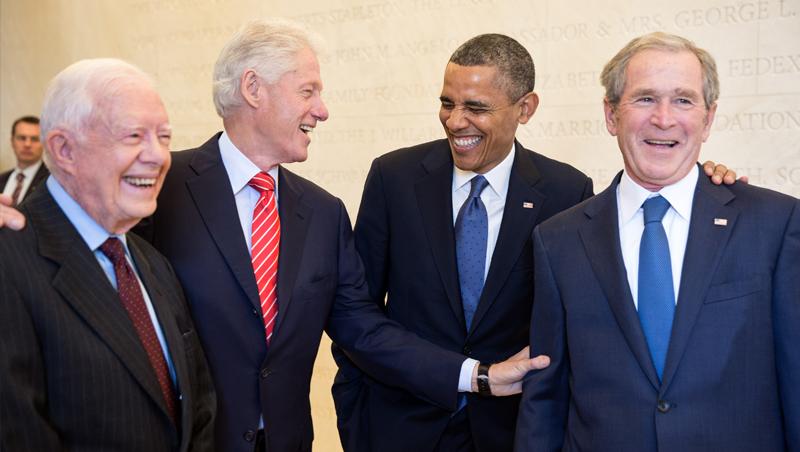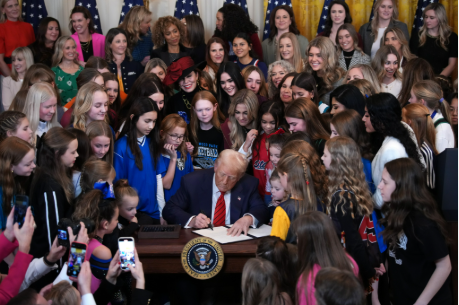On April 30, 1789, George Washington became the first president of the new United States. Standing on a balcony at Federal Hall in New York City, he received a thirteen-gun salute in front of an enormous crowd that had been gathering since the early hours of the morning. Washington was elected unanimously, universally regarded as the best individual to lead the new country for whose independence he had just fought.
Every four years since, American voters have exercised their most basic democratic right, the right to vote, to decide on the individual they believe is best suited to run the country. As the circumstances and individuals taking part in those elections have varied, the definition of a competent American president has been continuously refined based on the perceived successes or failures of the last president and his administration. Today, in the midst of the contentious 2016 presidential election, it is essential for Americans to reflect on past presidents in order to gain perspective on those characteristics that define a successful presidency.
During his lifetime, Thomas Jefferson penned the Declaration of Independence; served as president, vice-president, Secretary of State, and Minister to France; founded the Library of Congress and the University of Virginia; and distinguished himself as an accomplished lawyer, architect, farmer, and inventor. Fluent in Spanish, Greek, Italian, French, and German, Jefferson was able to command respect at home and abroad through his intellectual ability. While not all presidents need to be Einsteins (or Jeffersons, for that matter), a successful one must be intelligent, capable of bringing together people with vastly different opinions, and able to make sound decisions under pressure. In Jefferson’s case, his worldliness and brilliance earned the United States high regard in its early days as a country. On the policy front, Jefferson and his advisors had to analyze and resolve complex situations involving Native Americans tribes and American involvement in foreign conflicts like the First Barbary War. Well-reasoned responses to matters like these enable the president to fulfill his basic responsibility to protect the American people and their interests.
Two and a half centuries later, the young, charming, and personable John F. Kennedy became the youngest man ever to be elected president. Although certainly bright, his charisma set him apart through his ability to connect with a generation of Americans who, like he, had grown up and experienced World War II. In the midst of Cold War hysteria, Kennedy was able to use his affable personality and trademark smile to calm the American people, bringing them confidence in the future during even the gravest of times. Together with his young family, he was able to relate to the American people through speeches, the media, and in person in a way few of his predecessors had been able to do. Especially during times of crisis, strength of character is needed to lead the American people.
More than just a symbol of American strength or a decision maker, the president is also a politician responsible for helping to pass legislation that will directly affect the American people. Kennedy’s successor, Lyndon B. Johnson, is a prime example of a president who successfully navigated the power dynamics of Congress to execute his plan for a “Great Society.” Throughout his presidency, Johnson successfully passed bipartisan legislation promoting urban development, extending health care to minorities, and combatting poverty using political skills he developed during his time as Senate Minority and Majority Leader. Any individual who wishes to have legislative success as a president must be able to reconcile partisan differences and work effectively alongside members of both political parties.
The foremost responsibility of the president is to protect the citizens for whom he serves. While a successful president does not necessarily have to have served in the military himself, he must demonstrate the ability to execute his duties as commander-in-chief. In the unfortunate, yet all too common, scenario that the United States gets drawn into war during a president’s term in office, he must be capable of coordinating diplomatic and military efforts to secure American interests and ensure peace with the least loss of life possible. Just over a month into his presidency, Abraham Lincoln was called into action to lead the Union during the Civil War. From his operation headquarters in Washington D.C. Using a telegraph as his primary means of communication, Lincoln, a veteran of the Black Hawk War, managed the Union campaign on the frontlines. In addition to his understanding of war strategy, Lincoln rallied northern support for the war through speeches and public appearances, an essential quality of any wartime president.
A great admirer of Lincoln, Barack Obama is the most recent example of a president whose legacy can be used to help define a competent president. After running on a platform that focused on ideas like “hope” and “change,” Obama has admittedly fallen short of many of his initial objectives. However, he has successfully restored trust and morality in the White House after two controversy-ridden administrations. Obama’s sense of integrity has been undeniable to the point that he has even drawn praise from conservative political commentators and constant critics like David Brooks. In an article entitled I Miss Barack Obama, Brooks admits, “Obama radiates an ethos of integrity, humanity, good manners and elegance.” Perhaps the most important of all presidential qualities, moral character instills trust between citizen and president. It garners respect from around the world and ensures that the government stays true to its democratic values. The next president will have to meet the high ethical standards Obama has set should he or she wish to be as well respected as his predecessor.
Believe it or not, presidents are humans too and, just like the rest of the people they represent, they have their own strengths and shortcomings. However, the aforementioned five men embody the core desirable qualities one should expect in any president: intelligence, charisma, political prowess, crisis management skills, and integrity. The importance of this position is such that voters bear great responsibility in choosing the man or woman who will lead their country for the next four years. Likewise, as the most visible symbol of the United States around the globe, the president, together with a trusted team of advisors, also has an obligation to represent the American people well.
Each of the forty-three presidents who have held the office has contributed to the definition of a competent president in their own way. Some, like Lincoln and Kennedy, have instilled programs that expanded democratic principles. Others, like Nixon and Clinton, have become embroiled in scandals that have eroded morality in the White House and led to a deep mistrust in government. As the 2016 presidential elections loom nearer, voters must look beyond the overblown political rhetoric, expensive campaign advertisements, and scripted campaign speeches and actually analyze each candidate’s leadership abilities. Will he or she be able to bring together a polarized Congress? How will he or she appeal Americans who belong to disenfranchised minorities? Is he or she capable of leading the country during a time when conflicts in the Middle East are heightening?
These are all questions that need to be asked by voters before they take to the voting booths this fall. Using history as a guide, each American voter needs to build a definition of an effective president for himself or herself and decide which current candidate best fits that definition. By focusing on the attributes of past successful presidents, voters will be able to make better-informed decisions about which individual they believe is the fittest to lead their country as it embarks on a new era of its history in an increasingly and volatile world.












